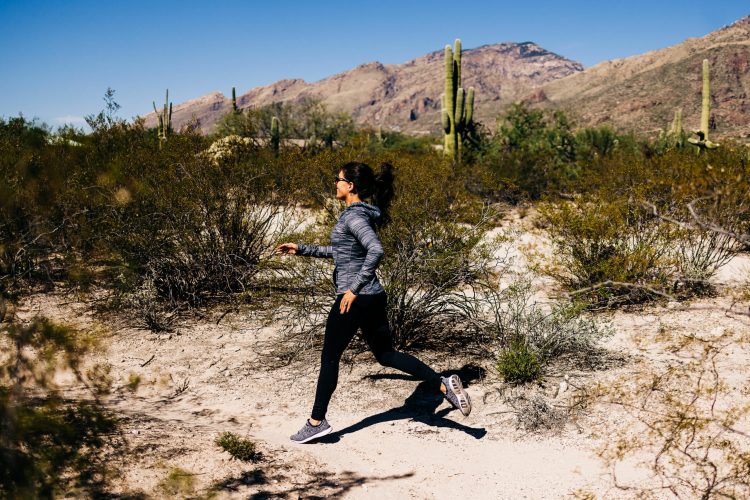Sharing tips for exercising in cold weather, benefits, and sample cold weather workouts.
Hi friends! How’s the morning going so far? I hope you’re having a great day. I’m getting in a quick Fit Team workout and getting ready for some out-of-town company; I can’t wait! I’m also going to take Maisey on a long walk because the weather has been dreeeeamy.
Even though the weather is starting to cool down, I’ve been thinking abut how important to keep up with a consistent routine, no matter the season. Cold weather can discourage us from working out, especially because it’s dark and can be verryyyy tempting to stay snuggled under the blankets. It can absolutely be a challenge to get up and head outside to work out, or to the gym, and finding the right motivation and routine can help you stay focused on your goals. Today, I’m sharing some practical tips on how to stay warm and injury-free while working out in the cold weather!
10 Tips for exercising in cold weather
Can you work out in cold weather?
You absolutely can, but it depends on your fitness level and if you’re used to the current climate. If you’re in Arizona like me and travel to Alaska in the freezing snow, it might be a little trickier to keep up with your outdoor workout routine. Of course, check with your doctor before making any fitness changes, and talk to your health provider if you have certain conditions that may prevent you from working out outdoors.
Some tips that may help:
Dress in layers
I like to layer my clothes, especially since the temperature fluctuates so much. You may start off with a jacket, long-sleeved tee, and tank, and end up just in your tank top by the time the workout is over. You can also wear high socks if you don’t want to start off with pants. I feel like layers is something you learn over time, especially what types of fabrics and coverage you prefer, and also how the weather behaves where you’re located. In Tucson, it’s winter at 5am, spring at 10am, summer at 2pm, back to spring at 5pm, and winter again by 8pm.
Wear sunscreen
Even if you’re cold, you may forget that being outdoors is still exposing you to the sun’s rays. Wear sunscreen on any areas that are likely to burn, especially if you’ll be out for a while. I wear this SPF on my face every single day.
Stay hydrated
The same thing goes with water! In the winter, it’s more easy to become dehydrated, because our sweat and the heat isn’t reminding us to drink water. Be sure to carry some type of water with you, and if you’re going to be doing a challenging or longer workout (greater than 1 hour), I recommend adding some electrolytes.
Wear the right gear
Extra goods, like an ear warmer, thermal leggings, and gloves can make a huge difference. You may also have to add an extra moisture barrier to your face (like a facial moisturizer), and lip balm if the air is dry and frigid.
Warm up and cool down
Warming up before your workout can help to increase tissue temperature, prepare the body for movement, and get your mindset in the game. Take the time to cool down after your workout, allowing the body temperature and heart rate to decrease.
Wear good shoes
*Good* doesn’t mean expensive. Make sure your shoes fit well and are suited to the type of activity you’re about to do. I highly recommend visiting a running store to get your gait checked by a professional. They can recommend shoes based on your particular workouts and whether you have pronation or supination.
Learn the signs of hypothermia and frostbite
Watch out for any signs from your body that it’s too dang cold, or you’re not dressed adequately for the weather. Shivering, slurred speech, exhaustion, confusion, and memory loss are huge red flags. Also watch out for numbness in your extremities and a body temperature below 95 degrees. Hypothermia is a medical emergency. Call 911 and get help immediately.
Stay within your levels
Don’t push yourself in new weather or new terrain, or think that you can maintain your full workout without easing into it. For example, if you typically go for an hour run when it’s sunny, try a 20 minute run in the cold and see how you feel. Increase the duration over time. Don’t be afraid to take your workout inside!
Have ID and a method to contact someone
When you’re doing any type of outdoor workout, be sure to take an ID with you and a method to contact someone, like a satellite watch or cell phone.
Even better: work out with a buddy
I definitely prefer outdoor workouts with friends. This way, you can make sure everyone stays safe, too. <3
Most importantly, don’t be afraid to take your workout inside if the weather is too extreme or outside your comfort level!
Benefits of working out in cold weather
Cold weather can help boost your immune system
When your body adapts to colder temperatures, it can make your immune system stronger.
It can potentially increase calorie burn
According to this study, exercising in the cold can burn more calories than exercising in warmer temperatures.
It can be a mood booster!
Moving our body in any capacity can release endorphins, which give us those feel-good warm fuzzies, which are extra appreciated during the darker months, when we may be more susceptible to seasonal affective disorder.
You can train your body in a different way
When the weather changes, it opens up new opportunities to work out in a different capacity. You may find that you enjoy certain activities more when the weather cools down! For example, I LOVE hiking, but I l love it much more when it isn’t 100 degrees.
Cold Weather Workouts
Here are some bodyweight workouts you can do outdoors (or indoors!) this winter!
Run/strength workout
Strength and power total body workout
How to train for a half marathon while strength training
So, tell me friends: do you workout outdoors when it’s chilly?
What’s a fitness struggle you experience over the winter months?
xoxo
Gina
Source by fitnessista.com










